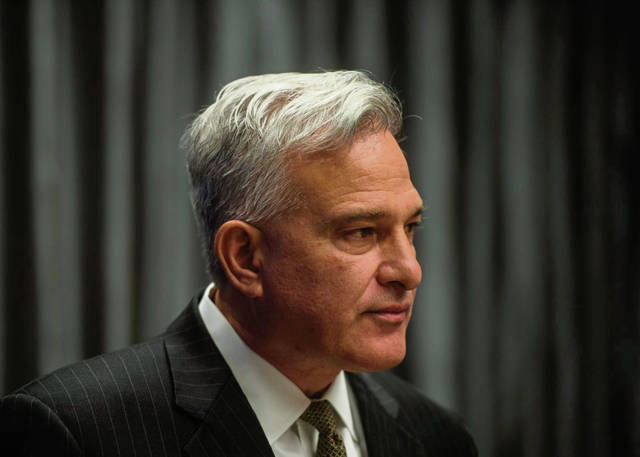Allegheny County District Attorney Stephen A. Zappala Jr. issued updated guidance to prosecutors in his office Sunday detailing how they should deal with allegations of discrimination.
A spokesman for the office said the new policy rescinds a previous one issued against defense attorney Milton Raiford. That policy forbade prosecutors from offering Raiford any plea agreements.
The latest memo outlining the updated policy was released on the DA’s office Facebook page on Monday.
It applies to all defense counsel, all defense counsel clients and all protected classes of individuals, spokesman Mike Manko wrote in an email.
The memo comes several days after Zappala came under fire following a report by the Tribune-Review that he had authored a May 18 email forbidding plea agreements to Raiford, who described the DA’s office as “systematically racist” during a May 13 court hearing.
In the memo sent to prosecutors on Sunday, Zappala said that “this office’s review of plea offers made to only one attorney and only about racism will not necessarily achieve the goals of consistency in treatment of all defendants or avoiding false claims of discrimination.”
Instead, Zappala wrote that if a defendant or their attorney raises an allegation of discrimination, a prosecutor should gather all facts and report, if necessary, to their supervisor.
“As usual, any plea offers must be based on evidence and all the surrounding circumstances. From now forward, if any attorney or unrepresented defendant raises concerns that the plea offer is treating the defendant differently because of the defendant’s protected status, then the assistant district attorney shall obtain all facts upon which the attorney or defendant relies in making the assertion, including any cases that the attorney or defendant allege are comparable to the defendant’s case,” the letter said.
“The assistant district attorney shall investigate the facts and, if necessary, bring the matter to the attention of their supervising deputy district attorney or the front office for aid in the investigation and input on the appropriate plea offer,” the letter added.
Zappala said on Thursday that his policy prohibiting plea deals to Raiford, whom he did not name in Sunday’s memo, was “to ensure that this office makes consistent, evidence-based decisions, and avoids false claims of racism.”
The long-time district attorney also said in the Sunday letter that the claims of systemic racism made by Raiford during that May 13 hearing were the first time that he’d ever heard such an accusation.
Zappala asked the prosecutors in his office to make a written report to First Assistant District Attorney Rebecca Spangler whenever there is an allegation of discrimination, as well as the outcome of the investigation, so the front office “can track and analyze the allegations in order to aid this office to maintain the consistency for which it strives.”
On Monday, Raiford said he doubts his comments were the first time Zappala heard allegations of systemic racism in Allegheny County.
“I make that argument just about everywhere. Systematic racism — the system starts with the encounter on the street between a police officer and a Black man,” Raiford said. “It’s revealing the heart of Stephen Zappala.”
Raiford called Zappala’s weekend memo “garbage,” adding, “I think it’s stonewalling the fact he violated my constitutional rights and the rights of my clients. The mule’s out of the barn, and he’s trying to protect himself. It changes absolutely nothing.”
Raiford added: “He has never apologized to me.”
Fordham University Law Professor Bruce Green, an expert in prosecutorial ethics who followed this issue, said he does not read the new policy to rescind the earlier one against Raiford.
“It’s a new and different policy, reminding prosecutors to make charging and plea bargaining decisions based on evidence,” Green said. “It’s somewhat pointless, since the theory of structural racism is that it is baked into the process, not that individual prosecutors are consciously making racist decisions. It also ignores learnings about unconscious bias. And, so, it shows a certain obtuseness about the earlier criticism of the office.”
Green said the instruction for defense attorneys to report accusations of discrimination seems pointless.
“Not many defense lawyers will risk the prosecutors’ enmity by making these accusations, especially not after witnessing the office’s vindictiveness, and given that the accusations certainly won’t do individual clients any good,” he said.
David A. Harris, a University of Pittsburgh law professor who studies race in the criminal justice system, said the policy outlined by Zappala in Sunday’s memo ought to already be in place.
“That should already be happening,” Harris said. “‘If you have a problem, come to us.’ That’s not a new policy. That’s got to be the case all the time.”
Harris said the response from Zappala misses the point of what Raiford was initially trying to express.
“It was less about a particular plea offer, though that may have been included, and more about the system and the actions of the DA’s office as a whole.”
Examining individual claims of discrimination in a single case will not reveal if there is racial impact or systemic racial choices being made, Harris said.
“You can’t really tell if you have a systemic process if you don’t look at the run of the entire system,” he said. “A person could say a white person would get a better deal, but how would you go about proving that? It would be very difficult.”
Harris does not think that Zappala’s new policy will change the opinion of those who have been calling for change in the office or the DA’s resignation.
“I think the damage has already been done,” Harris said. “And, for people focusing on those larger issues, this won’t do much to change the picture in their minds.”








